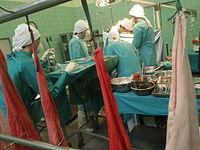
Photo from wikipedia
PURPOSE OF REVIEW The aim of this review is to describe the latest investigations into the immunobiology of aging and the potential impact on outcomes after mechanical circulatory support implantation… Click to show full abstract
PURPOSE OF REVIEW The aim of this review is to describe the latest investigations into the immunobiology of aging and the potential impact on outcomes after mechanical circulatory support implantation and heart transplantation. This information is relevant given the growing numbers of older patients with heart failure undergoing evaluation for mechanical circulatory support device (MCSD) or heart transplantation. RECENT FINDINGS A host of aging-associated aspects of immune dysfunction have been described in the general population including T-cell senescence, exhaustion, and terminal dedifferentiation, as well as impaired function of innate immune cells. Another important consequence of T-cell senescence is inflammation, which is known to have a strong relationship with both heart failure and frailty in older patients. Recent data on the association between T-cell and monocyte phenotypes as well as evaluation of gene expression and adverse outcomes after MCSD suggests the potential value of immunologic assessment of MCSD and heart transplant candidates and recipients. Measurement of physical frailty represents another avenue for patient evaluation that may complement immunologic assessment. Determination of immune dysfunction and frailty prior to transplantation may have implications for choice of induction and dosing of maintenance immunosuppression. SUMMARY As the age of transplant and MCSD candidates and recipients continues to increase, it is important for providers to recognize the potential impact of aging-associated immune dysfunction and how it may influence candidate selection, postintervention monitoring, and adjustment of immunosuppression.
Journal Title: Current Opinion in Organ Transplantation
Year Published: 2020
Link to full text (if available)
Share on Social Media: Sign Up to like & get
recommendations!